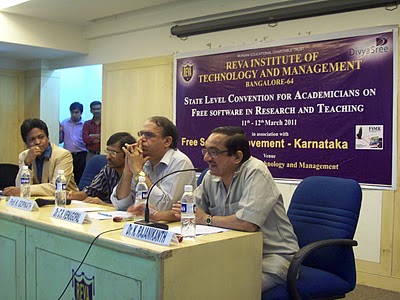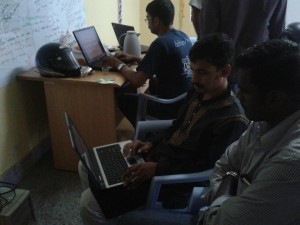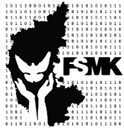Having missed most of the excitement of the two days of the State level academicians convention on Free Software in Research and Teaching, I arrived at the venue fortunately to get a chance to attend the panel discussion. The topic of discussion was “Foss in Curriculum”. The discussion was moderated by Senthil and the panel consisted of the following distinguished persons.
Prof. K Gopinath, IISc
Dr. K. Rajnikant, Principal, MSRIT
Dr. C. R. Venugopal, Prof and Head, SJCE, Mysore
Dr. Sunil Manvi, Prof and Head, Reva ITM

A time limit of 8 minutes was given to each panellist to express their views. Senthil started the discussion by stating the position of Free Software Movement on the subject. He said that the whole FOSS movement was started initially by academicians and researchers from various universities who did not want vendor lock in for the tools they were using in their research. Hence it was apt for even faculties and university as a whole to ensure that there is no vendor specific courses or instances in the syllabus. He compared the situation of profs struggling to understand the proprietary tools even when FOSS tools are available like people trying to get the recipe of Coco-Cola even though there is tender coconut available. He emphasized that when tools are proprietary and hence closed for everybody, how will the students be able to play with it and understand it. It is like asking a mechanic to learn to repair the car without actually being allowed to open the car hood. With this, he asked Dr. K. Rajnikant to express his views.
Dr Rajnikant who is principal of MSRIT and also an academic senate member of VTU was the VTU representative for this panel discussion. He told that when the questions comes of mandating tools in curiculum, there are many factors they need to consider. Due to this factors, they are forced to keep a blend of both proprietary and FOSS tools in the syllabus. One such factor was the importance of the knowledge of tools to the students placement. If the industry is using mainly a proprietary tool in particular domain then for helping students to get placed in the industry, they will have to inclucate such a tool in the syllabus. However, he made it very clear that VTU did not have any mandate on compulsarily using any proprietary tools in the curiculum. For example, he told that the graphics subject is already being thought using OpenGL which is a popular FOSS cross-platform API for developing graphics applications. Hence colleges always have freedom to explore various FOSS tools if they want. But in reality, since colleges already have paid licensed versions of proprietary tools and thier profs already have put effort in developing course material around the proprietary tools, they are unwilling to move to FOSS tools. Another factor he pointed was that at present, students are using the just the tools to develop the applications and not to actually understand how the tool is developed and internals of it. Hence for them, it does not matter even if the source code of the tools actually exist. In conclusion, he made it very clear that VTU in near future as such cannot mandate the use of FOSS tools in its syllabus and it was necessary for them to keep a blend of both proprietary and FOSS tools in the curiculum.
After this, Prof C. R. Venugopal from SJCE, Mysore and also an academic senate member of VTU right at the outset declared that he was a lover of open-source. He said that during his post-graduation in IIT-Bombay, there was already a culture of Eat Breathe and Drink Linux. He emphasized that as a computer science engineer, a student must be knowing inside out of the computers which can only be possible if they start playing with the source code of the tools which is possible only with FOSS in the curiculum. He said that the main problem that needs to be addressed immediately is the lack of faculties who can teach current subjects with FOSS tools.
Prof Gopinath started the discussion by giving his encounters in life for promoting FOSS. He said that when he had started teaching his subject, operating systems, he was making use of minix and encouraged students to start enhancing it and he found many students who were able to do it. He said that even after trying hard to equip his department machines to linux, he was not successful way back in 1992 as it was considered to be inferior. But within next 2-3 years, the institute itself started getting pre-loaded linux machines and soon all the machines were running only on Linux. In his opinion,FOSS is the perfect platform, a infrastructure to start to building things on it. Hence, it is the right way to teach any subject. He also said that, instead of colleges going to industry to buy licenses of softwares, colleges should actually invest on developing the necessary tools internally. He said that if the faculties find FOSS tools to be not as competitive as a proprietary software, then it should be used as a base for teaching. It can then be used to understand the problem and solve it. He also mentioned that he was probably a wrong person as a panellist as he has always been using FOSS and anything other than that is unthinkable to him. Hence even for the sake of discussion if he suddenly starts talking anything against using FOSS, then probably his head needs to be checked.
After Prof Gopi’s such strong statement, Prof Manvi, from Reva ITM was asked to express views on the discussion. He said that only FOSS tools can be played with. Hence a student should definitely use FOSS tools during his course. He also emphasized that at a time when colleges have very limited funds for infrastructure, they are forced to cut costs in every possible way and hence using FOSS tools in lab is a very viable option for colleges also. He mentioned that it costs around 5 lakhs per annum for 30 machines license of a popular proprietary tool used in Electronics department of which he is the HOD. If there is a FOSS alternative, like Scilab, then colleges should definitely use it. He said that using FOSS tools even after taking support license from vendors will save as much as 30% of the costs. He also mentioned that it is very difficult for colleges to use industry tools as the tools keep changing every 2-3 years and it is very difficult for them to upgrade it. It is even unnecessary for them to upgrade to newer versions as the subject fundamentals that they teach in the course remain the same. He pointed that the immediate problem that needs to be addressed is to the lack of necessary documentation for every FOSS tools so that the faculties can go through them and start using it. He saw this as the major hindrance for using FOSS in curriculum and if addressed it will certainly boost the rate at which colleges are moving to FOSS. Hence he requested organization like FSMK and FSMI to work on it. As a first step, he asked FSMK to come up with complete lab manuals for present lab subjects using FOSS tools.
With this we came to the end of the panel discussions and since very less time was left, Senthil quickly made the conclusion that as of now there was no complusion from university for colleges to use proprietary tools and if the few hinderance pointed by panellists were solved, colleges will deifinetely start using FOSS.
Again due to time constraints, only two questions were allowed. In the first one, an Audience pointed that to allow students to go to depth, it was necessary for the university to decrease the breadth of the course. For this, Dr. Rajnikant pointed that as an university it was necessary for them to look at a bigger picture while deciding the course. There are colleges which lack faculties in particular subjects and if the depth was increased then the lack of faculties for such subjects will be more. Hence they have to decide the curiculum keep these factors in mind. However, he pointed that under the university there were 14 autonomous colleges which had the freedom to decide their syllabus in each subject and conduct examination accordingly. But for this, colleges need to prove their abilities only after which the university can award them with such freedoms.



